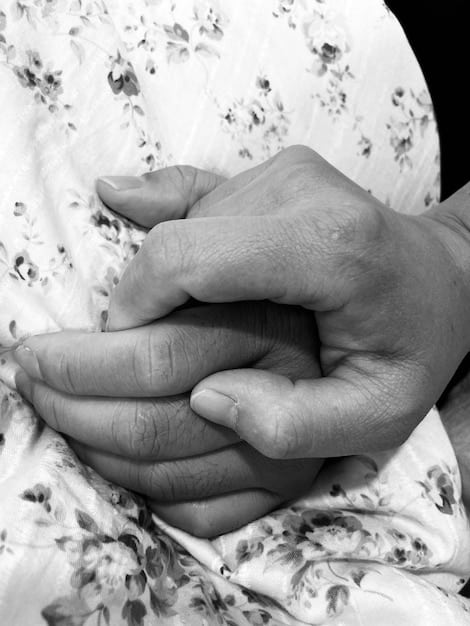Navigating Grief and Loss: Coping Strategies for a Brighter Future

Navigating grief and loss involves understanding the emotional impact and adopting healthy coping mechanisms such as seeking support, practicing self-care, and engaging in mindful activities to foster resilience and promote a brighter future.
Loss is an inevitable part of life, and navigating grief and loss: healthy coping mechanisms for a brighter future involves profound emotional challenges. This article provides practical strategies to help you navigate this difficult journey and build a path towards healing and hope.
Understanding Grief and Its Impact
Grief is a natural response to loss, but understanding its various forms and impacts can greatly aid in the healing process. It’s more than just sadness; it encompasses a range of emotions and experiences unique to each individual.
Recognizing the multifaceted nature of grief is a key step toward developing healthy coping strategies. This section explores the different dimensions of grief and how it affects individuals.
The Emotional Spectrum of Grief
Grief manifests in a wide array of emotions, making it a complex and deeply personal experience. Understanding these emotions can help individuals better process their loss.
- Sadness: A common and natural reaction to loss, often accompanied by feelings of emptiness and despair.
- Anger: Can stem from a sense of injustice or frustration over the loss, directed at oneself, others, or even the deceased.
- Guilt: Often arises from unresolved issues or regrets related to the relationship with the person who was lost.
- Anxiety: The uncertainty and fear about the future without the loved one can lead to increased anxiety levels.

Physical and Psychological Symptoms of Grief
Grief is not solely an emotional experience. It can manifest in physical and psychological symptoms that further complicate the healing process.
Physical symptoms can include fatigue, changes in appetite, sleep disturbances, and even physical pain. These symptoms often contribute to the overall sense of distress and can hinder the ability to cope with daily life.
- Fatigue and Exhaustion: The emotional toll of grief can lead to significant physical fatigue, making simple tasks feel overwhelming.
- Sleep Disturbances: Insomnia, restless sleep, or nightmares are common, disrupting the body’s natural healing processes.
- Changes in Appetite: Some individuals may experience a loss of appetite, while others may turn to comfort foods, leading to unhealthy eating habits.
Psychologically, grief can manifest as difficulty concentrating, memory problems, and a sense of detachment from reality. These cognitive and emotional challenges can make it difficult to engage in normal activities and maintain relationships.
In conclusion, recognizing the diverse range of emotional, physical, and psychological symptoms associated with grief is essential for developing comprehensive coping strategies. By acknowledging these impacts, individuals can take steps to address their specific needs and promote overall well-being during the grieving process.
Building a Support System
Having a robust support system is crucial when experiencing grief and loss. This network can provide emotional, practical, and social assistance during difficult times.
Building and maintaining a support system involves both seeking out connections and nurturing existing relationships. This section explores how to create a supportive environment that aids in the healing process.
The Importance of Social Connections
Social connections offer a sense of belonging and understanding, which can be incredibly comforting when grieving. Sharing experiences with others can alleviate feelings of isolation and provide new perspectives.
Connecting with family and friends who offer empathetic listening and support can make a significant difference. Engaging in social activities, even when it feels challenging, can help to counteract feelings of loneliness and detachment.
Finding the Right Support Groups
Support groups provide a community of individuals who have experienced similar losses. Sharing experiences with others who understand can be validating and empowering.
- Shared Experiences: Support groups offer a space where individuals can openly share their feelings and experiences without judgment, knowing that others understand.
- Coping Strategies: Members of support groups often share effective coping strategies, providing new ideas and approaches to manage grief.
- Reduced Isolation: Participating in a support group can significantly reduce feelings of isolation by creating a sense of belonging and mutual support.
Seeking Professional Help
Sometimes, the intensity of grief requires professional intervention. Therapists and counselors can provide specialized support and guidance.
Seeking professional help is not a sign of weakness but rather a proactive step towards healing. Therapists can offer tools and techniques to process grief, manage difficult emotions, and develop healthy coping strategies.
- Personalized Strategies: Therapists tailor their approach to meet the unique needs of each individual, providing personalized strategies to manage grief.
- Unbiased Support: A therapist offers an objective perspective, free from personal biases or emotional involvement, allowing for a clear and supportive environment.
- Emotional Processing: Therapy provides a structured space to explore and process complex emotions, helping individuals to understand and manage their grief in a healthy way.
In conclusion, building a strong support system through social connections, support groups, and professional help can significantly enhance the ability to navigate grief and loss. By fostering these connections, individuals can find comfort, understanding, and practical assistance during challenging times.
Self-Care Strategies for Healing
Self-care is essential for healing during grief. Taking care of your physical, emotional, and mental well-being can provide strength and resilience.
Implementing self-care strategies involves conscious choices and consistent efforts to nurture oneself. This section explores various self-care practices that can aid in the healing process.
Mindfulness and Meditation
Practicing mindfulness and meditation can help individuals stay grounded in the present moment and reduce feelings of anxiety and overwhelm.
Mindfulness involves paying attention to your thoughts, feelings, and sensations without judgment. This practice can promote a sense of calm and clarity, allowing for a more balanced perspective.
- Reduced Stress: Mindfulness techniques can help lower stress levels by promoting relaxation and reducing the impact of negative thoughts.
- Emotional Regulation: Regular meditation can improve emotional regulation, enabling individuals to manage difficult emotions more effectively.
- Increased Self-Awareness: Mindfulness cultivates self-awareness, helping individuals understand their emotional patterns and responses to grief.
Physical Exercise and Nutrition
Engaging in physical exercise and maintaining a healthy diet can significantly impact mood and energy levels, supporting overall well-being during grief.
Physical activity releases endorphins, which have mood-boosting effects. Additionally, a balanced diet provides the necessary nutrients to support physical and emotional resilience.

Creative Expression
Expressing emotions through creative outlets, such as writing, painting, or music, can be a powerful way to process grief.
Creative expression allows individuals to externalize their feelings and experiences, providing a sense of release and understanding. Engaging in creative activities can also promote a sense of joy and purpose during difficult times.
In conclusion, prioritizing self-care through mindfulness, physical exercise, and creative expression is vital for healing during grief. By nurturing their well-being, individuals can build resilience and navigate the grieving process with greater strength and clarity.
Engaging in Meaningful Activities
Engaging in activities that bring joy, purpose, and meaning can provide a sense of normalcy and hope during grief.
These activities can range from hobbies and social engagements to volunteering and pursuing personal goals. This section explores how to identify and incorporate meaningful activities into daily life.
Rediscovering Hobbies and Interests
Reconnecting with hobbies and interests that were once enjoyed can provide a sense of continuity and pleasure during grief.
Rediscovering these activities can offer a distraction from grief and a reminder of the joys and passions that still exist. Engaging in familiar activities can also create a sense of comfort and stability.
Setting Small, Achievable Goals
Setting small, achievable goals can provide a sense of accomplishment and purpose, counteracting feelings of helplessness and despair.
- Sense of Control: Achieving small goals can restore a sense of control and empowerment during a time of uncertainty.
- Boosted Confidence: Successfully completing tasks, no matter how small, can enhance self-esteem and confidence.
- Future Focus: Goal-setting encourages a focus on the future, creating a sense of hope and forward momentum.
Volunteering and Helping Others
Volunteering and helping others can provide a sense of purpose and connection, shifting the focus from personal grief to the needs of others.
Helping others can offer a sense of meaning and fulfillment, as well as a broader perspective on one’s own struggles. Engaging in acts of kindness can also foster feelings of gratitude and connection.
In conclusion, engaging in meaningful activities is a powerful way to navigate grief and loss. By rediscovering hobbies, setting goals, and helping others, individuals can cultivate a sense of purpose, joy, and hope during challenging times.
Understanding the Grieving Timeline
Understanding that grief has no fixed timeline is crucial in managing expectations and allowing for a more natural healing process. Grief is a highly individual experience, and its duration varies greatly.
Accepting that there is no “right” way to grieve and no set time to heal can reduce the pressure and self-judgment often associated with loss. This section explores the typical stages of grief and the importance of allowing oneself to grieve at their own pace.
Acknowledging the Stages of Grief
While not everyone experiences them in a linear or predictable fashion, understanding the commonly recognized stages of grief can provide a framework for processing loss.
The five stages of grief – denial, anger, bargaining, depression, and acceptance – were first introduced by Elisabeth Kübler-Ross. These stages can help individuals recognize and understand their emotional reactions during grief.
- Denial: A state of disbelief or shock that helps cushion the initial impact of loss.
- Anger: Feelings of frustration, resentment, and bitterness, often directed at oneself, others, or the deceased.
- Bargaining: Attempts to negotiate with a higher power or fate in exchange for a different outcome.
- Depression: Feelings of sadness, hopelessness, and despair as the reality of the loss sets in.
Allowing Time for Healing
The grieving process requires time, patience, and self-compassion. Rushing the process or suppressing emotions can hinder healing.
Allowing oneself to feel and process emotions, rather than trying to avoid or suppress them, is essential for healthy grieving. It’s also important to seek support when needed and to be patient with the healing process.
In conclusion, understanding the grieving timeline and allowing ample time for healing is essential for navigating grief and loss. By acknowledging the stages of grief and practicing self-compassion, individuals can support their emotional well-being and move towards acceptance and healing.
Maintaining Hope for the Future
Maintaining hope during grief involves nurturing positivity, setting new goals, and finding meaning in life after loss.
This section explores strategies for fostering hope and creating a brighter future despite the pain of grief. By focusing on personal growth and resilience, individuals can find renewed purpose and joy.
Setting New Goals and Aspirations
Setting new goals and aspirations can provide a sense of direction and purpose during grief, helping to shift focus from the past to the future.
These goals can be small and achievable, such as learning a new skill, pursuing a hobby, or planning a trip. Setting meaningful goals can foster a sense of hope and excitement about what lies ahead.
Finding Meaning and Purpose
Finding new meaning and purpose in life after loss can be a transformative process, helping individuals to honor the memory of their loved ones while moving forward.
- Personal Growth: Grief can lead to significant personal growth, as individuals develop resilience, empathy, and a deeper understanding of life.
- Impactful Actions: Engaging in activities that make a positive impact, such as volunteering or advocating for a cause, can provide a sense of purpose and meaning.
- Lasting Legacy: Honoring the memory of loved ones by creating a lasting legacy, such as a scholarship or foundation, can provide comfort and inspiration.
In conclusion, maintaining hope for the future involves setting new goals, finding meaning, and cultivating positive relationships. By focusing on personal growth and resilience, individuals can navigate grief with strength and create a brighter future for themselves and others.
| Key Point | Brief Description |
|---|---|
| 🫂 Building Support | Connect with friends, family, or support groups for emotional assistance. |
| 🧘 Self-Care | Practice mindfulness, exercise regularly, and maintain a balanced diet. |
| 🎨 Meaningful Activities | Engage in hobbies, set small goals, and volunteer to find purpose. |
| ⏳ Time for Healing | Allow yourself time to grieve and heal without rushing the process. |
Retractable FAQ Section
▼
Acknowledge your feelings, allow yourself to cry, and seek support from friends, family, or a therapist. Engage in activities that bring comfort.
▼
Yes, anger is a common emotion. It’s crucial to express it in healthy ways, such as through exercise, journaling, or talking to a therapist.
▼
Practice mindfulness, exercise regularly, eat nutritious meals, ensure you get enough sleep, and engage in hobbies that bring you joy and relaxation.
▼
Search online directories, ask your doctor or therapist for recommendations, or explore community centers. Find a group where you feel safe and understood.
▼
Grief has no set timeline; it’s unique to each individual. Allow yourself time to heal without pressure. Seek professional help if the grief feels overwhelming.
Conclusion
Navigating grief and loss: healthy coping mechanisms for a brighter future requires a multifaceted approach that encompasses understanding, self-care, support, and hope. By integrating these strategies into your life, you can foster resilience and move towards a future filled with renewed purpose and joy.





